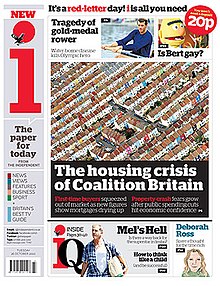I have done a lot of analysis on other newspapers which are more similar to what i am aiming to achieve, therefore i wont do much of an analysis on this newspaper - more of a reflection on a newspaper which i read often. I have kept in mind that this is a national newspaper, however, unlike most national newspapers it has a no-celebrity gossip content, like local newspapers.
It costs 20p which widens the audience to buy it, but this is daily. My newspaper (even though only doing two pages!) is going to be tabloid size similarly to 'i' and also, on one page it has small articles from different subjects such as business, politics and sport. The price of the newspaper makes the readership of people who are from diverse backgrounds and able to buy the newspaper often, therefore the newspaper gains a big audience often - this is also how they make money.
In every 'i' issue there is an editorial feature written by the editor in chief of the newspaper. This makes the newspaper seem more friendly and personable and also, the way it is written is much less formal, therefore encouraging the reader to read on. I have chosen that i am not going to do that in my first two pages as there isn't much room and also i wanted to get to the point in the first two pages.
The main purpose of this newspaper is for people who do not have much time to read a newspaper. However, I'm not really marketing my newspaper like this as i feel that my articles would be too long and meaningful (culture and lifestyle articles) to be read in a short amount of time.

http://www.independent.co.uk/i/
The newspaper also bases their pitch on having no celebrity gossip in their pages (please see below!), which i am also doing. I feel like it wouldn't target my educated audience who would have has years of reading about celebrity gossip in the pages of their national newspapers. In local newspapers there are usually no celebrities, and i think that 'i' has taken this and made it national.
I think it was a very brave move launching a newspaper with no celebrity gossip and costs only 20p to buy, however it seems to have worked and i think because it comes from the same company as The Independent they do have something to fall back on.
It was big news when the newspaper was launched because it was such a new and risky concept:
http://www.bbc.co.uk/news/uk-11626362 - This page has a video on it which shows the production of 'i' newspaper and also shows that a national newspaper being 20p is something to write about.
http://www.marketingweek.co.uk/sectors/media/i-newspaper-has-reason-to-celebrate-on-its-first-anniversary/3031304.article - Many people doubted this newspaper, but this article's subject is on what a successful year 'i' has had as it's doubter's eat humble pie.
Why was it doubted? It was low in price, it had no celebrity gossip, it has plenty of educational articles, it was for people who wanted a quick read, it was aiming at an audience of a variety of ages and most of all it was new - an untested new newspaper. The newspaper wanted to tap into the younger audience as well as the older with short and snappy articles on the subject of a vast variety of things.
The banning of an 'i' TV advert
While trying to find the TV advert of 'i' which i have seen many a time, i was reminded of the banning of that TV advert. It was banned due to false advertising about not including any celebrity gossip. It was apparently misleading because the newspaper runs a daily caught and social column. Even though this TV advert was banned, i feel like it did sum up well what the newspaper was about.
I wanted to find the banned advert, but i couldn't find it on the internet, or anywhere. When the word 'banned' is used, you instantly think someone has been insulted or hurt by a comment or it has caused a strongly negative reaction or epidemic. This shows that something being banned could just mean it was misunderstood or mis-told. The media using the word 'banned' is quite ironic - it is very over dramatic, eye-catching and people would want to read it. The word banned, i believe, didn't have to be used to describe the advert.
Banned adverts often get more publicity and have a better effect than controversial ones - the controversial ones can have a negative effect on the newspaper, therefore making people believe that the newspaper has no good intentions, or isnt good.

No comments:
Post a Comment
Note: only a member of this blog may post a comment.